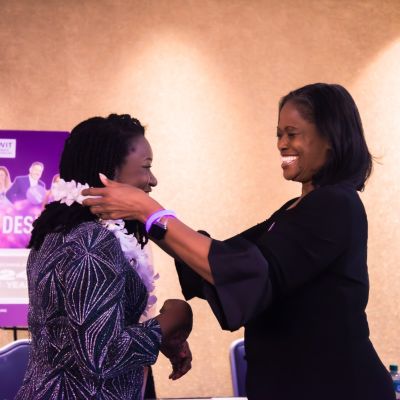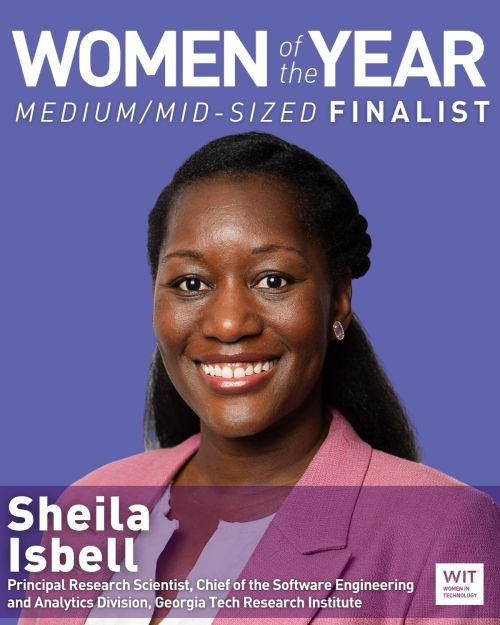Page Contents
- Spotlight on Excellence: Sheila Isbell, 2024 WIT Awards Finalist
- Sheila Isbell
- Sheila’s Advice and Inspiration:
- Can you share your career journey and what led you to your current role in the tech/STEAM field?
- What inspired you to pursue a career in tech/STEAM, and who has been your most significant influence?
- What challenges have you faced as a woman/girl in STEAM, and how did you overcome them?
- Can you share a moment or project you are particularly proud of in your career?
- What excites you most about the future of technology/your field?
- How have you contributed to innovation or change in your organization or community?
- How do you use your position to empower or mentor other women/girls in STEAM?
- Can you give us an example of how you’ve supported diversity, equity, and inclusion in your work?
- If you could go back to the start of your career, what would you tell your younger self?
- What are your goals for the future, and how do you hope to continue making an impact in STEAM?
- How do you envision the future of women in technology, and what changes would you like to see?
- Why is WIT’s mission essential and how do you see the organization influencing the personal and career growth of those involved?
- What does selection as a finalist for the WIT Awards mean to you, and how do you feel this recognition can inspire others?
- Support Women In Technology
Spotlight on Excellence: Sheila Isbell, 2024 WIT Awards Finalist
About the Women of the Year Awards
The Women of the Year Awards, hosted annually by Women In Technology (WIT), celebrates exceptional women across Georgia who are making a significant impact in Science, Technology, Engineering, Arts, and Mathematics (STEAM). Now in its 24th year, the WIT Awards honor leaders, innovators, and advocates who pave the way for future women in STEAM.
Sheila Isbell
Sheila’s Advice and Inspiration:
“The advice that I would give to young women and girls considering a career in STEAM is to know that they don’t have to choose. The cool part about STEAM is that it is a combination not the isolation of science, technology, engineering, art and math. And their power is taking the pieces that makes the most sense for them and applying it to solve the problems that most impact their world/communities. You can see the results of your contributions almost immediately in a career in STEAM and yet feel the reverberations of it (technically, culturally, academically) for years.”


Can you share your career journey and what led you to your current role in the tech/STEAM field?
My career journey focuses on access to useful actionable information for decision making and being an active community leader and member. While my titles and responsibilities have changed over the years, that is fundamentally what I do. Whether it was leading a small team of developers to build a tool used health providers all over the world for childhood vaccinations or it was building an enterprise system to manage the health and wellness of US service members – my ultimate goal was providing access for action. Whether it was encouraging a group of junior researchers to connect on social and technical ideas or managing the careers of software engineers and social scientists – my ultimate goal was to provide a community and clear the path for great innovation. I think it’s quite important to know that we don’t have to wait for titles or power to do the thing that most know must happen.
What inspired you to pursue a career in tech/STEAM, and who has been your most significant influence?
As a kid I was an artist: a writer, poet, painter. However, I was always interested in science because my father is a scientist. On a field trip to the Chesapeake Bay in Virginia, I was lured by the impact that environmental science could have on how we live and the people in the world. In college, I was exposed to computer science and realized it was a fantastic way to incorporate all of the things that I have loved over the years: art, science, impact, and people. What has kept me in this career are the stories of people who could just use a little bit of information to improve their lives. I am driven by the ability to get people access to that information.
What challenges have you faced as a woman/girl in STEAM, and how did you overcome them?
The challenge I face as a woman in STEAM, is that I am unexpected. I have to continue to advocate to be seen as a technical enough and executive-leader enough. I overcome this questioning of whether I am enough by not focusing on myself but instead leaning into my contributions to the technical, programmatic, and team needs of the work. Recognition will flow from that.
Can you share a moment or project you are particularly proud of in your career?
It’s hard to pick one particular project. My most proud moments involve struggle, fear, dealing with the unknown, accelerated learning and some type of success – usually learning something new and knowing that as a team, we can achieve great things. Which describe a lot of my projects!
What excites you most about the future of technology/your field?
What excites me most about the future of technology is becoming more democratized in terms of the creators of tech and the users of tech. When tech is made by all people, it can be for all people.
How have you contributed to innovation or change in your organization or community?
I have contributed to innovation and change in my organization by advocating for and leading research with people data at the center of the problem space. It has brought in a whole new set of designers, developers, and product owners. It has contributed to progress in the way that we work and the types of research that we are known for. I I was involved in a lot of our early health and humanitarian work, whether it was focused on data in small clinics in south Georgia or for health regulatory agencies in Kenya. I have been very proud to have people data and people leadership associated with my name.
How do you use your position to empower or mentor other women/girls in STEAM?
I am a result of many hands lifting me, guiding me, nudging me…forward. Whether it was through art, math, science, or engineering programs…someone said yes to investing in time, money and resources for me. That is why and how I give back. I use my position to empower, mentor, create events, provide opportunities for, hire and retain other women and girls in STEAM. I make myself available to serve on panels, committees, talks to share how I got into STEAM, to represent what a computer scientist looks like, to talk about ways to navigate a career in technology and to lend support for those who face challenges in achieving their tech dreams.
Can you give us an example of how you’ve supported diversity, equity, and inclusion in your work?
I support DEI several ways in my place of work. I did it earlier in my career by being on hiring committees and advocating for diversity in degrees, universities and experiences in who we hire. I then started working on building safe and inclusive community for junior researchers and then eventually my own division of researchers. Finally, I became the inaugural executive sponsor of an ERG and we have created incredible programming that celebrates, educates and advocates all employees with a goal of increasing belonging and connection so that we work together better on our impactful research projects.
If you could go back to the start of your career, what would you tell your younger self?
I would tell my younger self that they don’t know what they are doing either. So explore, play, experiment, and fail more. That computer science is a science in that experimentation and failure is part of the process. That computer science is art in that you can create something that lands differently on so many people.
What are your goals for the future, and how do you hope to continue making an impact in STEAM?
My recent goals were about being a legacy of leaders and collaborative teams in my organization. My upcoming goals are related to scale. How can we collaborate and make our joint efforts, passions, skills, and knowledge reach more with more impact.
How do you envision the future of women in technology, and what changes would you like to see?
I would like to see women being able to show up as our full selves at work on day one of being in technology. Authenticity should not be a privilege of seniority.
Why is WIT’s mission essential and how do you see the organization influencing the personal and career growth of those involved?
I believe WIT’s mission is essential because it’s breadth and depth in terms of scope to help women thrive and change the world through technical innovations. WITS spans the whole career lifecycle from k-12 to executive. Additionally, WIT is inclusive. WIT invites women who may not see themselves in tech. The organization tells them there is a place for them, that they belong in the room, there is a seat for them at the table, and that the totality of their perspective and experience matters.
What does selection as a finalist for the WIT Awards mean to you, and how do you feel this recognition can inspire others?
Selection as a finalist is meaningful to me to not only join a prestigious line of women making a big difference in our state, but also as representation that this, too, is what leadership in technology looks like, sounds like, and acts like. I hope to inspire others to you can be successful while being true to yourself.
